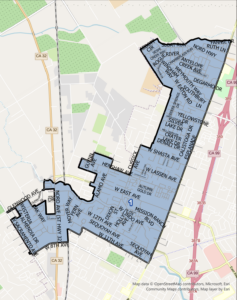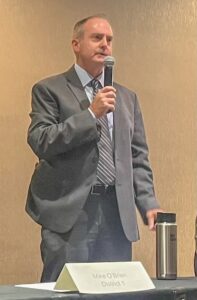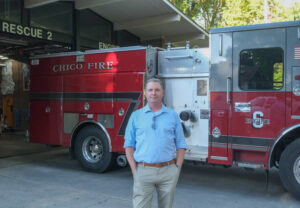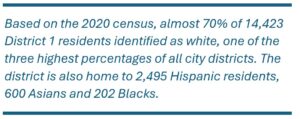by Yucheng Tang
posted Oct. 1
Editor: ChicoSol will cover the races for four City Council seats that voters will decide in the Nov. 5 General Election. The first in our series is District 1, where candidate Michael O’Brien has outspent opponent Michael Johnson by almost nine times. (See graphic below.)
Candidate Mike O’Brien is the head of Butte County Interagency Narcotics Task Force and a former Chico police chief; his opponent, Mike Johnson, is a businessman running an IT consulting business and a U.S. Navy officer.

ChicoSol interviewed and photographed Johnson on Sept. 17. O’Brien did not respond to requests for an interview that were delivered in texts, emails and phone calls. The two Mikes have both focused on homelessness, public safety and infrastructure improvements in their campaigns. But ChicoSol found their approaches quite different.
Homelessness: more accountability or managed campgrounds?
District 1 includes single-family homes, mobile home parks and vibrant small businesses; it has a chain grocery outlet, auto repair shops and a bowling alley. And it’s a district that, like others, has homeless residents.
The candidates agree that homelessness is an urgent issue and believe it’s a problem related to public safety. But while O’Brien talks about accountability, Johnson talks about managed campgrounds.

O’Brien said he wants to bring accountability to the homeless, especially those shelter-resistant people who continue to camp in public spaces. During the Sept. 17 candidates forum at the Chamber of Commerce, he indicated he viewed addiction and mental illness as the driving causes of homelessness rather than a lack of affordable housing.
“If we don’t address those two things, we will never get a handle on this particular issue,” O’Brien said. “It’s our job generally to look at ways to get help to those people. Sometimes that help must be compelled. That’s a tough word. No one likes that word compel.”
He mentioned that drug rehabiliation could be an important way to address this problem.
As police chief for five years – O’Brien retired in 2020 – he worked on clearing homeless encampments. As police chief at the beginning of the pandemic, he opposed the City Council majority that wanted to leave small encampments in place in order to comply with the government’s COVID-19 guidelines.
O’Brien said a couple of times during the forum that the community shouldn’t relinquish “public space” to homelessness.
However, Mike Johnson, O’Brien’s opponent, compared homelessness to cancer, and said people cannot treat cancer by only dealing with the tumor.
“There’s a lot of money in that district and people want to protect their investments,” Johnson noted in an interview with ChicoSol. “If I’m a business owner, I don’t want customers to be scared away by homeless populations. If I’m a resident that lives there, I don’t want homeless people that are just walking through my neighborhood and rummaging through my things and getting into my life and making me feel unsafe. That’s a valid thing to be worried about.

“It all stems from the fact that we’re not dealing with homelessness itself as this kind of cancer on the body politic,” he said. “We’re wasting time so far with lots of law enforcement efforts and pushing encampments around that haven’t reduced homelessness at all.”
Johnson would address homelessness by building multiple, smaller, managed campgrounds of 25 to 30 people. He emphasized the benefits: “Smaller sizes means they’re easier to keep clean, they’re easier for the police in terms of keeping people safe and orderly and minimizing drugs, weapons, and crime. And it’s also easier for the social workers, the substance use disorder counselors, the mental health professionals to get to them, and vice versa.”

Small managed campgrounds would make the homeless less shelter-resistant and provide an opportunity for them to transition to life under a roof, he said.
The residents who ChicoSol talked to in the district also have divergent attitudes.
An assistant grocery store manager, Ben Lima, told ChicoSol that many unhoused people have stolen things from the market, and theft had become more frequent in the past year. He believes homeless people should make the changes they need to make and the government should only provide short-term assistance.

“The person needs to rise up,” Lima said. “If they’re stuck on drugs, they need to go through the proper channels, beat the addiction, go to counseling, get a job, hold it steady.”
Asked about managed campgrounds, he said: “But that money comes out of our pocket right?”
A 74-year-old resident of a mobile home park also commented, but did not want to give her name because she is politically in the minority in her neighborhood. She said she has never worried about personal safety issues related to the homeless. “People try to divide people, and make the homeless the ‘other,’” she said. “We just need to be nicer to them when we meet them.”
Etienne, a District 1 resident ChicoSol interviewed in a grocery parking lot, did not want to give his last name, but noted that homelessness is a complicated issue: “If we build more shelters, it might invite more homeless people from other places; [but] if we don’t bring services to them, it doesn’t solve the problem as well.”
Etienne said he might not vote for either of the candidates because the result would likely be the same.

Public Safety: More money to police or fire protection?
Both candidates prioritize public safety and infrastructure improvements.
O’Brien discusses public safety in a short paragraph on his campaign website. In order to ensure safety, he says the City “must have adequate funding and resources for the police department, allowing for more officers, better training, and advanced equipment.”
His website does not provide more detail.
Johnson, on the other hand, believes it’s important to ensure the safety of District 1 by providing a fire station. Johnson told ChicoSol that District 1 doesn’t have a fire station and the closest station — Chico Fire Department Station 2 — is a 7 to 10-minute drive.
“We’re still at a positive risk in my own district” that’s not just about fire, he said.
“If someone’s having a heart attack, a stroke, a sort of medical event or they need somebody for a car accident — anything that would have a need for emergency services — usually the fire department is the first one on the scene, and it takes the fire department this long to get there.”
Johnson said too much of the budget is going to the police department and the City needs to allocate more money to other areas. “A fire station in the district is a huge factor for public safety. It makes more sense to direct dollars to it,” he said.
He believes that building a fire station outweighs almost any other concern, whether it’s going to be building more homes or investing in businesses, that it’s a matter of whether the “egg or the chicken comes first.”
“We can’t support what we have there right now with existing fire services,” Johnson said. “If we want to continue to expand the district, we need to have a fire station first.”
Yucheng Tang reports for ChicoSol as a California Local News Fellow.

This was well reported piece with the candidates’ different positions clear and conise inspite of one of the candidates refusing -one wonders why – to be interviewed. The boxed facts on spending, voter registration and race self-identification was a nice touch to give the reader context. The fact that it was well written and had good quotes made it a pleasure to read.